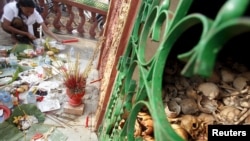Youk Chhang has spent 20 years documenting the horrors of Cambodia's Khmer Rouge “Killing Fields” regime and his team has provided half a million documents to a U.N.-backed tribunal building cases against those responsible.
But police have refused to arrest three former senior Khmer Rouge cadres charged with crimes against humanity, and the police have the implicit support of Prime Minister Hun Sen in refusing not to cooperate.
At a cost of more than $200 million and after a decade of work, the court has managed to deliver guilty verdicts against just three high-ranking defendants, who are now in jail.
Millions of Cambodians living with the scars of Pol Pot's 1975-1979 genocidal wave of terror face the possibility the court will be unable to bring to justice those most responsible for the deaths of about 1.8 million people.
“Justice is a long and difficult road for all Cambodians,” said Youk Chhang, who told of beatings and torture at the hands of the Khmer Rouge. “There is nothing we can do. We do not want to do what the Khmer Rouge did to us. This has taken a lot of patience and forgiveness already.”
Most of the victims of the Khmer Rouge died of starvation, torture, exhaustion or disease in labor camps or were bludgeoned to death during mass executions. Pol Pot, “Brother Number One,” died in 1998.
National Deputy Police Chief Mao Chandara told Reuters his force would not detain the three recently accused.
“As our prime minister said, if we do this and it leads to a break up of the country, it won't be useful,” he said. “I am a police officer and it is my duty to protect the Royal Government and the Constitution.”
Hun Sen has warned that more trials could see the country spiral into civil war. A former Khmer Rouge soldier himself, he has vowed to prevent new indictments and said he would be happy if the U.N. left Cambodia.
Rights groups have accused authorities of trying to stifle the court to protect public figures. New York-based Human Rights Watch called on the U.N. to end its participation and on donors to stop funding, saying that it was a mockery of justice.
“The U.N. was brought in to ensure judicial independence and that cases would be based on evidence instead of politics, but it is now clear that political interference means that this will never happen,” HRW Asia director Brad Adams said in a statement.
Im Chaem, a Buddhist nun in her 60s, was charged in absentia in March with murder and crimes against humanity. She is a former Khmer Rouge district commander suspected of running a forced labor camp. She has not been arrested.
Meas Muth, a former navy chief in his 80s, has been charged in absentia with the execution of Vietnamese and Thai prisoners of war at the notorious S-21 prison. He also has not been arrested.
Ao An, 79, also known as Ta An, has been charged with “extermination, persecution on political and religious grounds and other inhumane acts” at detention centers, according to the court statement. He appeared to hear the charges but remains free.
Youk Chhang, director of the Documentation Center of Cambodia, recalled the hardships he suffered at Im Chaem's camp at the age of 15.
“Some died of starvation, exhaustion, and some were executed. I had only two spoons of water a day,” Youk Chhang, 54, told Reuters.
He pointed to scars on his ankles he said were left by chains as he was tortured for two weeks for stealing mushrooms.
“For me, this is a deep-cut memory,” he said. “I will never forget it








